MOD003379 - Examining Actual and Apparent Authority in Business Law
VerifiedAdded on 2023/05/31
|12
|3238
|427
Report
AI Summary
This report provides a comprehensive analysis of actual and apparent authority within the context of agency law, examining the roles of the agent, principal, and third parties. It explores the creation of agency relationships, the distinctions between express and implied actual authority, and the concept of apparent authority, supported by relevant case laws such as Ireland v Livingston and Freeman and Lockyer v Buckhurst Park Properties. The report also evaluates the advantages and disadvantages of both actual and apparent authority, highlighting the importance of protecting the rights of third parties while also addressing potential misuses of authority by agents. The analysis concludes by emphasizing the need for clarity in defining the scope of authority to avoid ambiguity and potential liabilities for the principal.
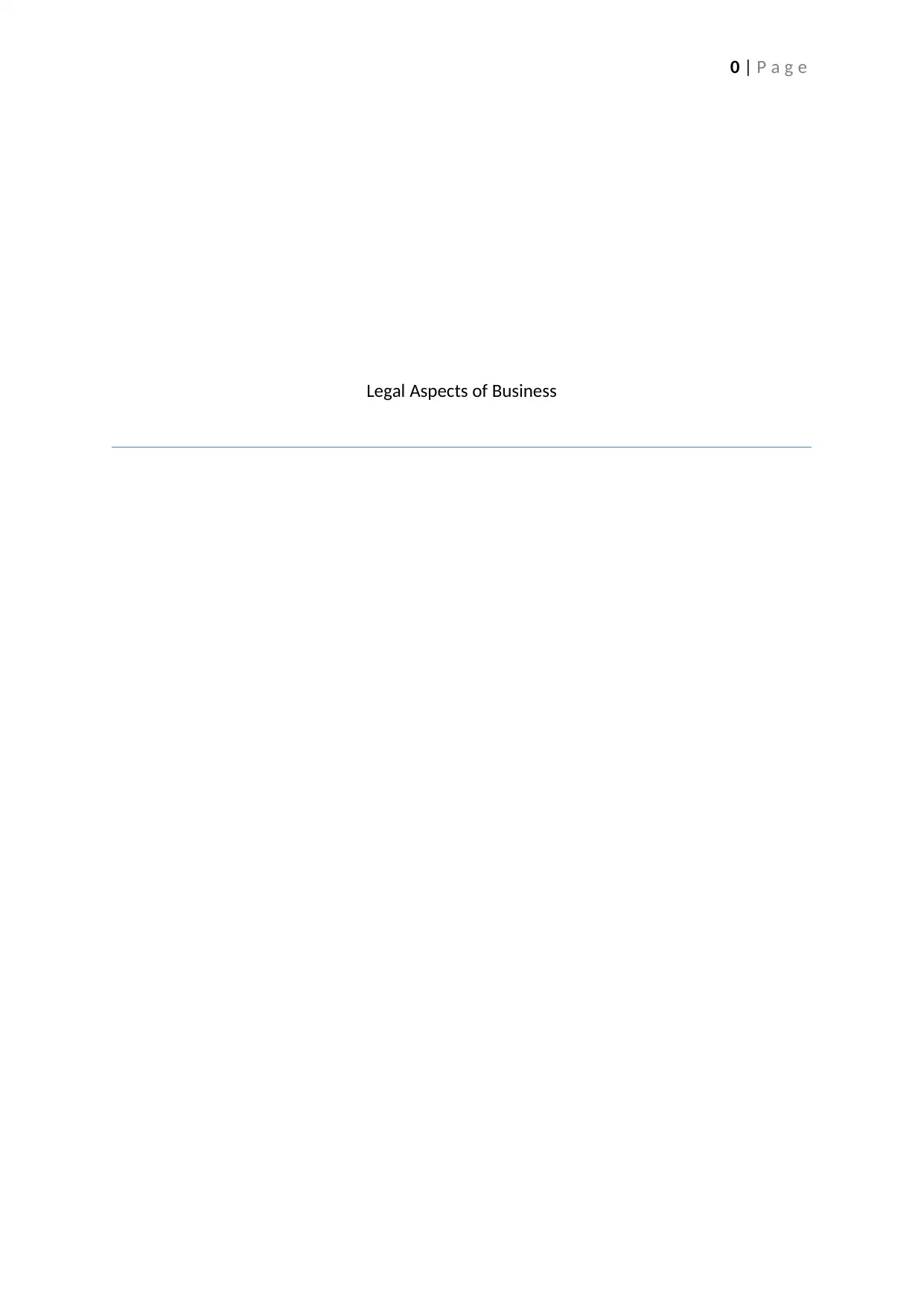
0 | P a g e
Legal Aspects of Business
Legal Aspects of Business
Paraphrase This Document
Need a fresh take? Get an instant paraphrase of this document with our AI Paraphraser
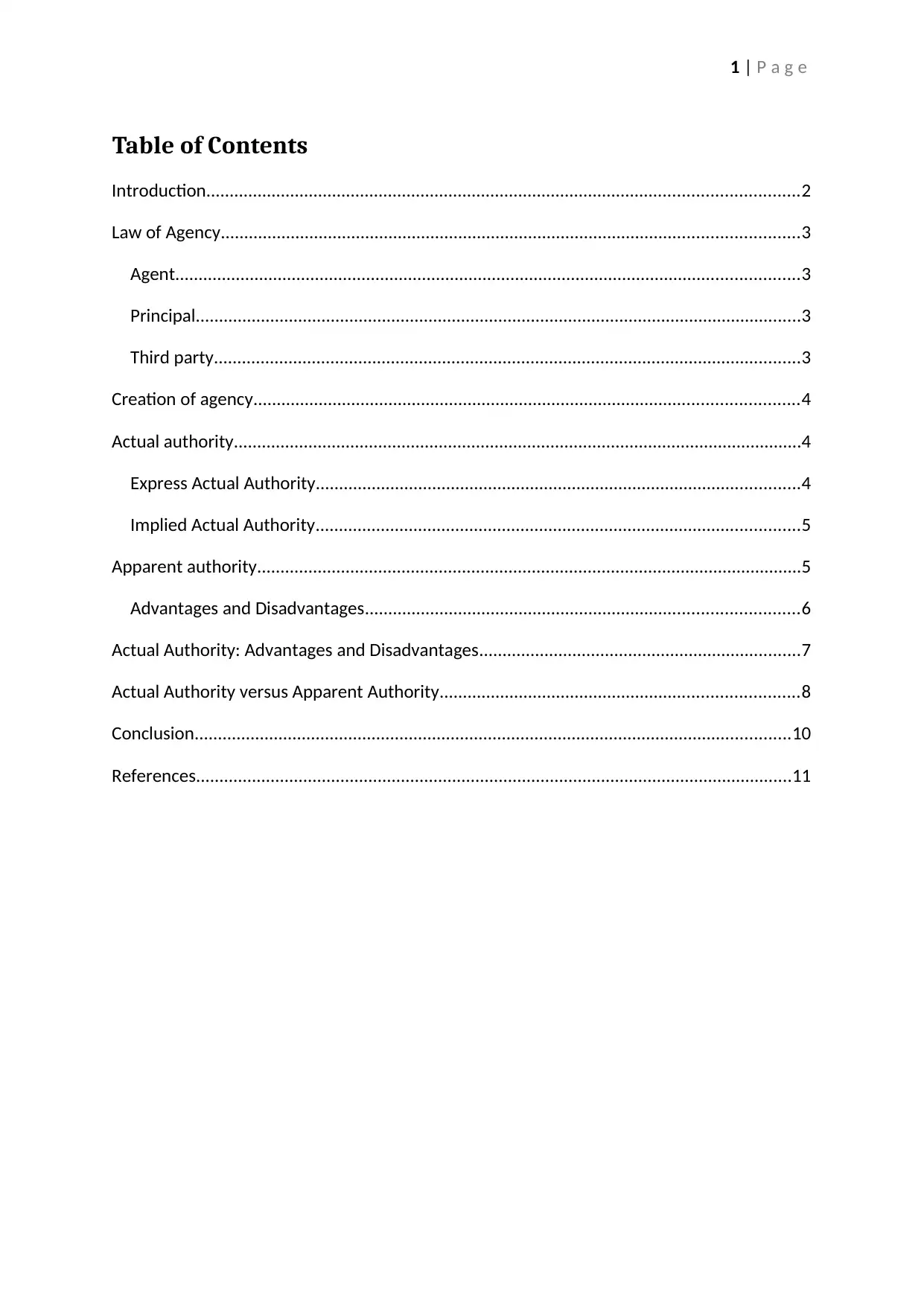
1 | P a g e
Table of Contents
Introduction...............................................................................................................................2
Law of Agency............................................................................................................................3
Agent......................................................................................................................................3
Principal..................................................................................................................................3
Third party..............................................................................................................................3
Creation of agency.....................................................................................................................4
Actual authority..........................................................................................................................4
Express Actual Authority........................................................................................................4
Implied Actual Authority........................................................................................................5
Apparent authority.....................................................................................................................5
Advantages and Disadvantages.............................................................................................6
Actual Authority: Advantages and Disadvantages.....................................................................7
Actual Authority versus Apparent Authority.............................................................................8
Conclusion................................................................................................................................10
References................................................................................................................................11
Table of Contents
Introduction...............................................................................................................................2
Law of Agency............................................................................................................................3
Agent......................................................................................................................................3
Principal..................................................................................................................................3
Third party..............................................................................................................................3
Creation of agency.....................................................................................................................4
Actual authority..........................................................................................................................4
Express Actual Authority........................................................................................................4
Implied Actual Authority........................................................................................................5
Apparent authority.....................................................................................................................5
Advantages and Disadvantages.............................................................................................6
Actual Authority: Advantages and Disadvantages.....................................................................7
Actual Authority versus Apparent Authority.............................................................................8
Conclusion................................................................................................................................10
References................................................................................................................................11
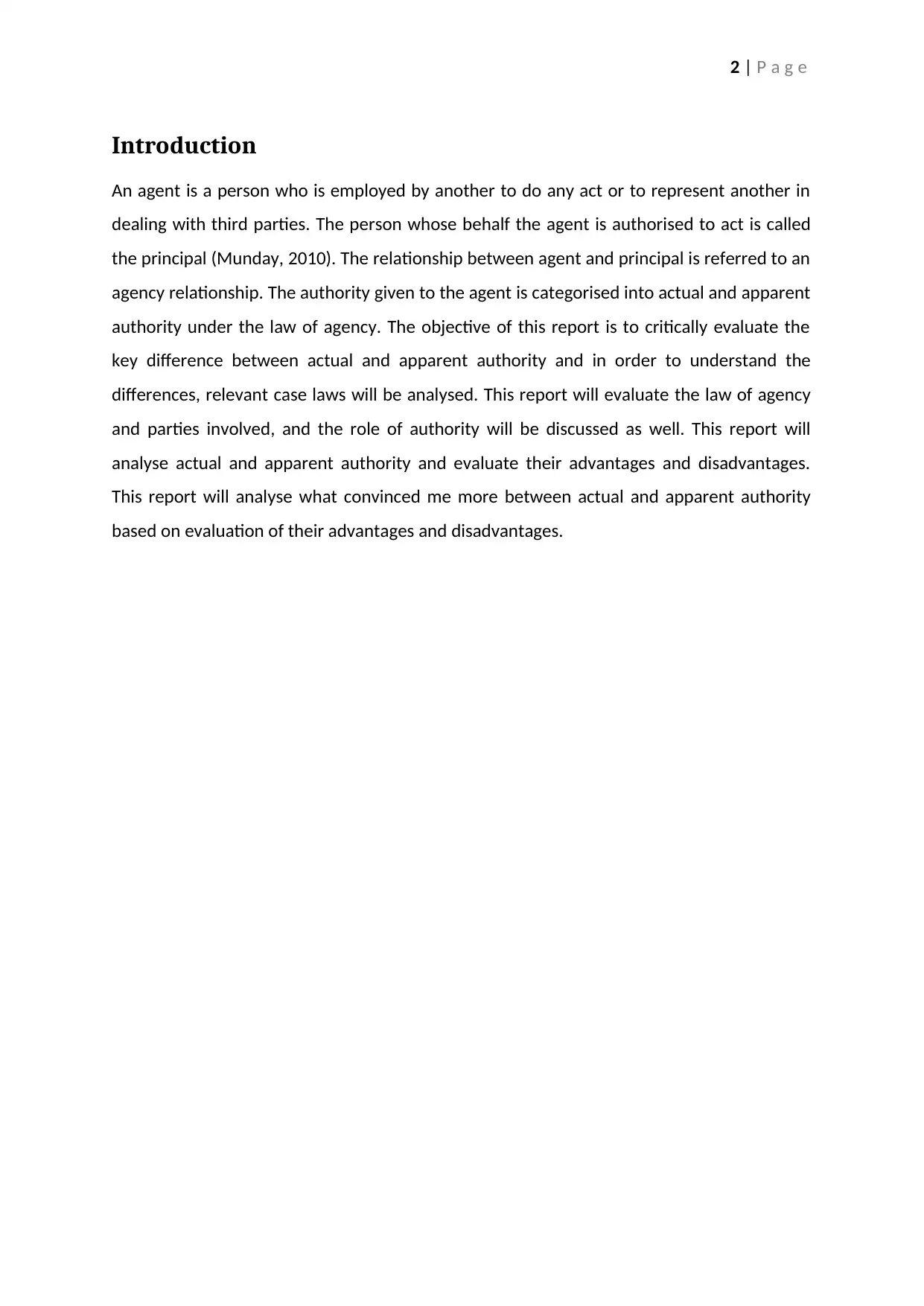
2 | P a g e
Introduction
An agent is a person who is employed by another to do any act or to represent another in
dealing with third parties. The person whose behalf the agent is authorised to act is called
the principal (Munday, 2010). The relationship between agent and principal is referred to an
agency relationship. The authority given to the agent is categorised into actual and apparent
authority under the law of agency. The objective of this report is to critically evaluate the
key difference between actual and apparent authority and in order to understand the
differences, relevant case laws will be analysed. This report will evaluate the law of agency
and parties involved, and the role of authority will be discussed as well. This report will
analyse actual and apparent authority and evaluate their advantages and disadvantages.
This report will analyse what convinced me more between actual and apparent authority
based on evaluation of their advantages and disadvantages.
Introduction
An agent is a person who is employed by another to do any act or to represent another in
dealing with third parties. The person whose behalf the agent is authorised to act is called
the principal (Munday, 2010). The relationship between agent and principal is referred to an
agency relationship. The authority given to the agent is categorised into actual and apparent
authority under the law of agency. The objective of this report is to critically evaluate the
key difference between actual and apparent authority and in order to understand the
differences, relevant case laws will be analysed. This report will evaluate the law of agency
and parties involved, and the role of authority will be discussed as well. This report will
analyse actual and apparent authority and evaluate their advantages and disadvantages.
This report will analyse what convinced me more between actual and apparent authority
based on evaluation of their advantages and disadvantages.
⊘ This is a preview!⊘
Do you want full access?
Subscribe today to unlock all pages.

Trusted by 1+ million students worldwide
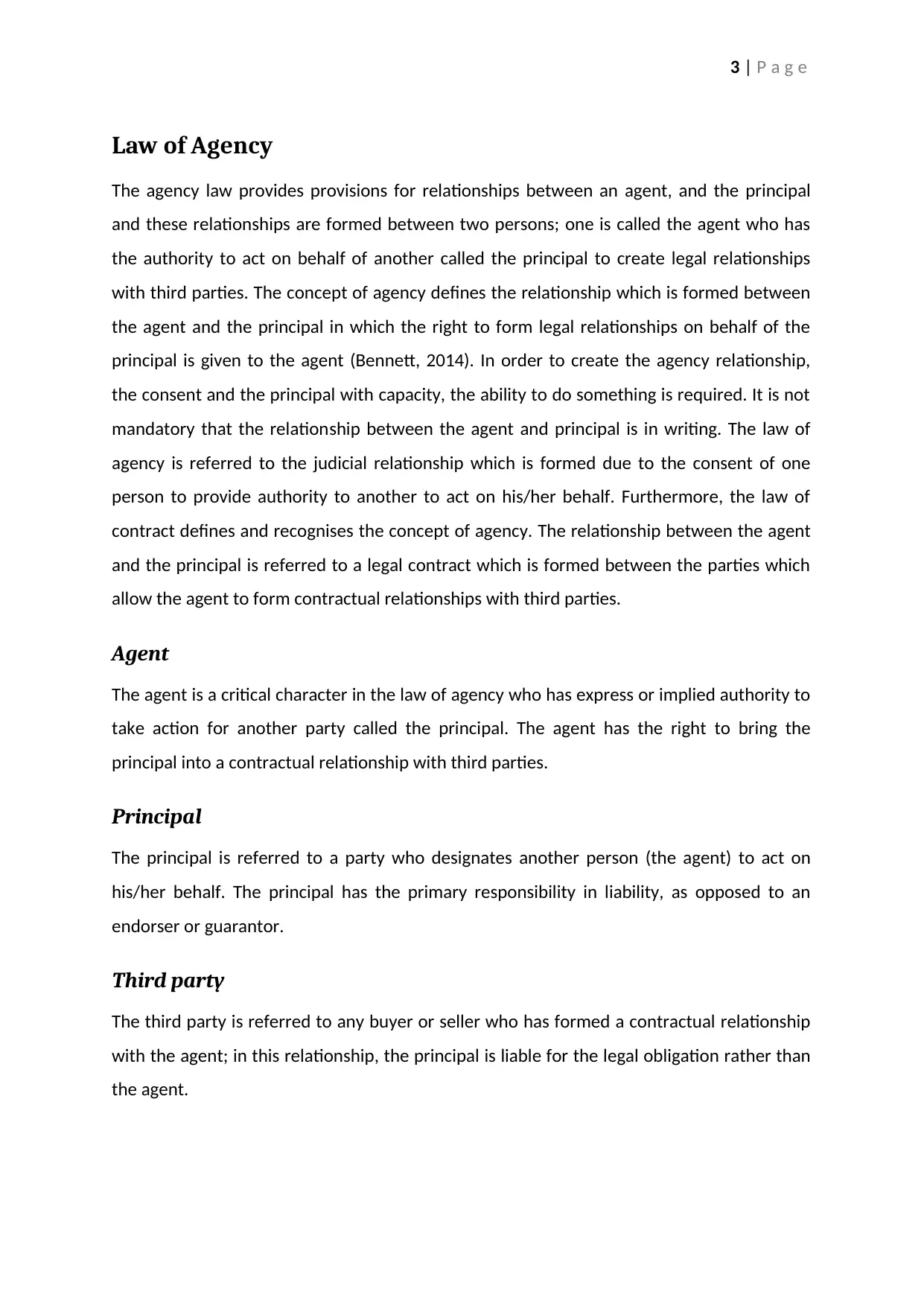
3 | P a g e
Law of Agency
The agency law provides provisions for relationships between an agent, and the principal
and these relationships are formed between two persons; one is called the agent who has
the authority to act on behalf of another called the principal to create legal relationships
with third parties. The concept of agency defines the relationship which is formed between
the agent and the principal in which the right to form legal relationships on behalf of the
principal is given to the agent (Bennett, 2014). In order to create the agency relationship,
the consent and the principal with capacity, the ability to do something is required. It is not
mandatory that the relationship between the agent and principal is in writing. The law of
agency is referred to the judicial relationship which is formed due to the consent of one
person to provide authority to another to act on his/her behalf. Furthermore, the law of
contract defines and recognises the concept of agency. The relationship between the agent
and the principal is referred to a legal contract which is formed between the parties which
allow the agent to form contractual relationships with third parties.
Agent
The agent is a critical character in the law of agency who has express or implied authority to
take action for another party called the principal. The agent has the right to bring the
principal into a contractual relationship with third parties.
Principal
The principal is referred to a party who designates another person (the agent) to act on
his/her behalf. The principal has the primary responsibility in liability, as opposed to an
endorser or guarantor.
Third party
The third party is referred to any buyer or seller who has formed a contractual relationship
with the agent; in this relationship, the principal is liable for the legal obligation rather than
the agent.
Law of Agency
The agency law provides provisions for relationships between an agent, and the principal
and these relationships are formed between two persons; one is called the agent who has
the authority to act on behalf of another called the principal to create legal relationships
with third parties. The concept of agency defines the relationship which is formed between
the agent and the principal in which the right to form legal relationships on behalf of the
principal is given to the agent (Bennett, 2014). In order to create the agency relationship,
the consent and the principal with capacity, the ability to do something is required. It is not
mandatory that the relationship between the agent and principal is in writing. The law of
agency is referred to the judicial relationship which is formed due to the consent of one
person to provide authority to another to act on his/her behalf. Furthermore, the law of
contract defines and recognises the concept of agency. The relationship between the agent
and the principal is referred to a legal contract which is formed between the parties which
allow the agent to form contractual relationships with third parties.
Agent
The agent is a critical character in the law of agency who has express or implied authority to
take action for another party called the principal. The agent has the right to bring the
principal into a contractual relationship with third parties.
Principal
The principal is referred to a party who designates another person (the agent) to act on
his/her behalf. The principal has the primary responsibility in liability, as opposed to an
endorser or guarantor.
Third party
The third party is referred to any buyer or seller who has formed a contractual relationship
with the agent; in this relationship, the principal is liable for the legal obligation rather than
the agent.
Paraphrase This Document
Need a fresh take? Get an instant paraphrase of this document with our AI Paraphraser
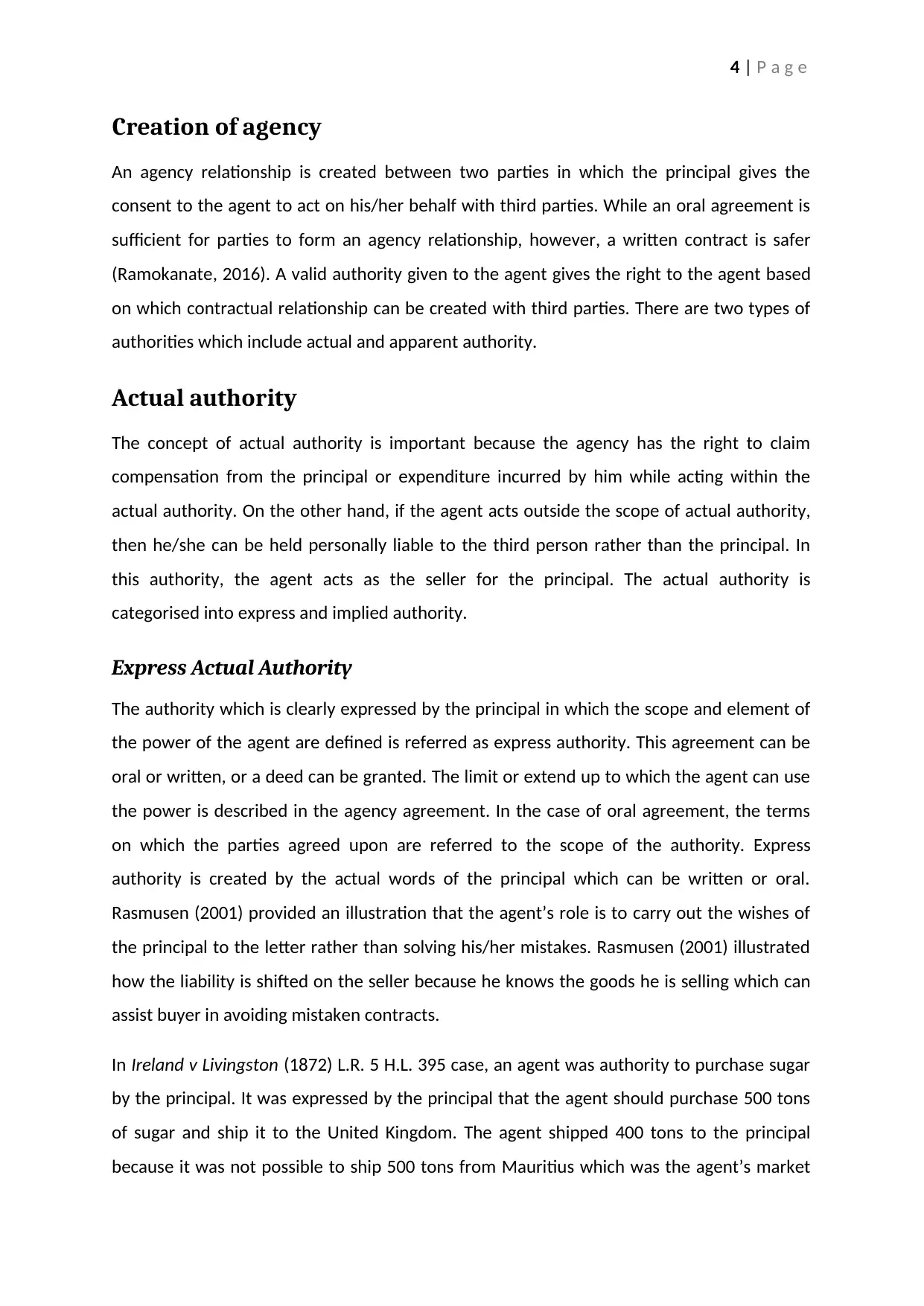
4 | P a g e
Creation of agency
An agency relationship is created between two parties in which the principal gives the
consent to the agent to act on his/her behalf with third parties. While an oral agreement is
sufficient for parties to form an agency relationship, however, a written contract is safer
(Ramokanate, 2016). A valid authority given to the agent gives the right to the agent based
on which contractual relationship can be created with third parties. There are two types of
authorities which include actual and apparent authority.
Actual authority
The concept of actual authority is important because the agency has the right to claim
compensation from the principal or expenditure incurred by him while acting within the
actual authority. On the other hand, if the agent acts outside the scope of actual authority,
then he/she can be held personally liable to the third person rather than the principal. In
this authority, the agent acts as the seller for the principal. The actual authority is
categorised into express and implied authority.
Express Actual Authority
The authority which is clearly expressed by the principal in which the scope and element of
the power of the agent are defined is referred as express authority. This agreement can be
oral or written, or a deed can be granted. The limit or extend up to which the agent can use
the power is described in the agency agreement. In the case of oral agreement, the terms
on which the parties agreed upon are referred to the scope of the authority. Express
authority is created by the actual words of the principal which can be written or oral.
Rasmusen (2001) provided an illustration that the agent’s role is to carry out the wishes of
the principal to the letter rather than solving his/her mistakes. Rasmusen (2001) illustrated
how the liability is shifted on the seller because he knows the goods he is selling which can
assist buyer in avoiding mistaken contracts.
In Ireland v Livingston (1872) L.R. 5 H.L. 395 case, an agent was authority to purchase sugar
by the principal. It was expressed by the principal that the agent should purchase 500 tons
of sugar and ship it to the United Kingdom. The agent shipped 400 tons to the principal
because it was not possible to ship 500 tons from Mauritius which was the agent’s market
Creation of agency
An agency relationship is created between two parties in which the principal gives the
consent to the agent to act on his/her behalf with third parties. While an oral agreement is
sufficient for parties to form an agency relationship, however, a written contract is safer
(Ramokanate, 2016). A valid authority given to the agent gives the right to the agent based
on which contractual relationship can be created with third parties. There are two types of
authorities which include actual and apparent authority.
Actual authority
The concept of actual authority is important because the agency has the right to claim
compensation from the principal or expenditure incurred by him while acting within the
actual authority. On the other hand, if the agent acts outside the scope of actual authority,
then he/she can be held personally liable to the third person rather than the principal. In
this authority, the agent acts as the seller for the principal. The actual authority is
categorised into express and implied authority.
Express Actual Authority
The authority which is clearly expressed by the principal in which the scope and element of
the power of the agent are defined is referred as express authority. This agreement can be
oral or written, or a deed can be granted. The limit or extend up to which the agent can use
the power is described in the agency agreement. In the case of oral agreement, the terms
on which the parties agreed upon are referred to the scope of the authority. Express
authority is created by the actual words of the principal which can be written or oral.
Rasmusen (2001) provided an illustration that the agent’s role is to carry out the wishes of
the principal to the letter rather than solving his/her mistakes. Rasmusen (2001) illustrated
how the liability is shifted on the seller because he knows the goods he is selling which can
assist buyer in avoiding mistaken contracts.
In Ireland v Livingston (1872) L.R. 5 H.L. 395 case, an agent was authority to purchase sugar
by the principal. It was expressed by the principal that the agent should purchase 500 tons
of sugar and ship it to the United Kingdom. The agent shipped 400 tons to the principal
because it was not possible to ship 500 tons from Mauritius which was the agent’s market
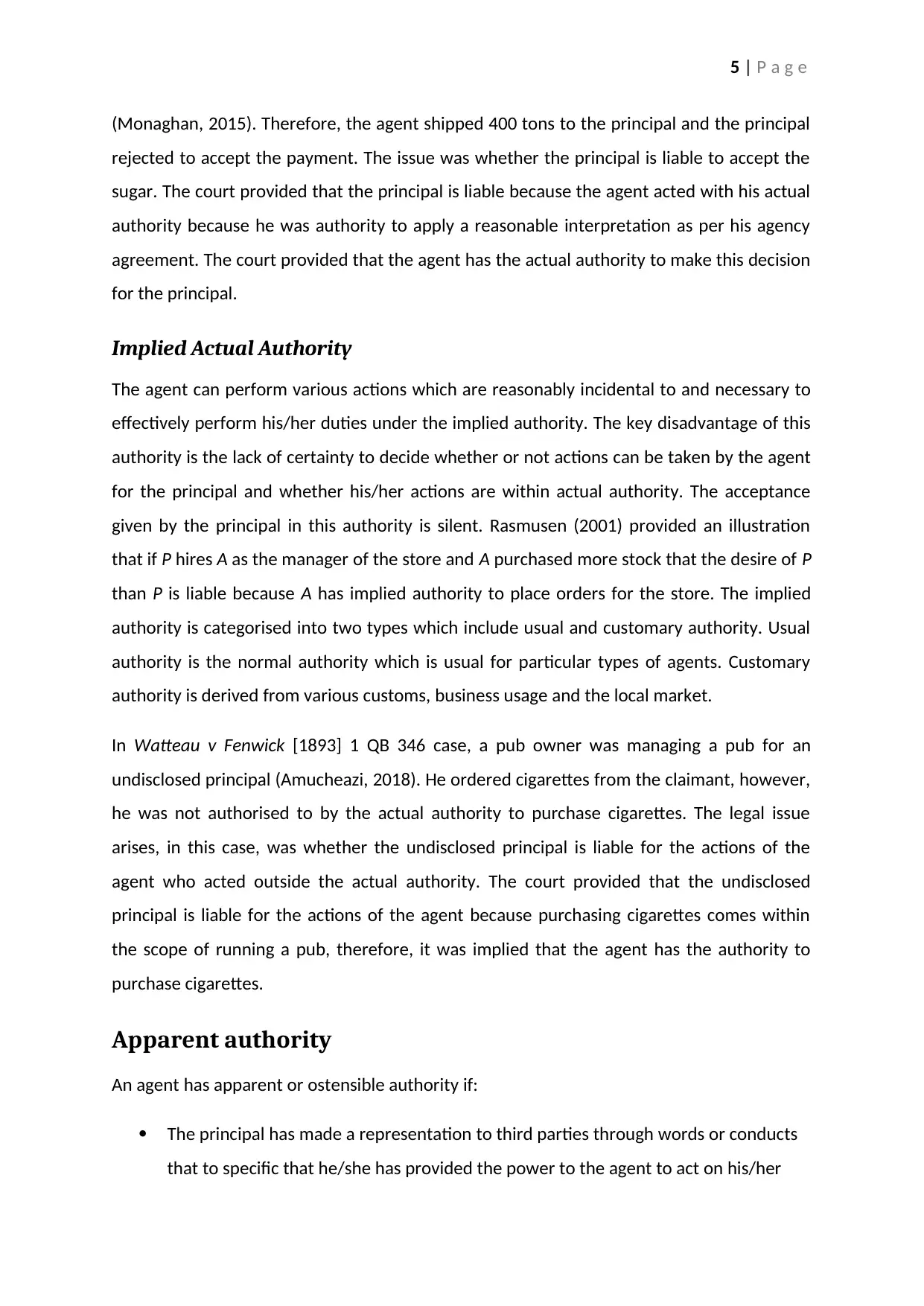
5 | P a g e
(Monaghan, 2015). Therefore, the agent shipped 400 tons to the principal and the principal
rejected to accept the payment. The issue was whether the principal is liable to accept the
sugar. The court provided that the principal is liable because the agent acted with his actual
authority because he was authority to apply a reasonable interpretation as per his agency
agreement. The court provided that the agent has the actual authority to make this decision
for the principal.
Implied Actual Authority
The agent can perform various actions which are reasonably incidental to and necessary to
effectively perform his/her duties under the implied authority. The key disadvantage of this
authority is the lack of certainty to decide whether or not actions can be taken by the agent
for the principal and whether his/her actions are within actual authority. The acceptance
given by the principal in this authority is silent. Rasmusen (2001) provided an illustration
that if P hires A as the manager of the store and A purchased more stock that the desire of P
than P is liable because A has implied authority to place orders for the store. The implied
authority is categorised into two types which include usual and customary authority. Usual
authority is the normal authority which is usual for particular types of agents. Customary
authority is derived from various customs, business usage and the local market.
In Watteau v Fenwick [1893] 1 QB 346 case, a pub owner was managing a pub for an
undisclosed principal (Amucheazi, 2018). He ordered cigarettes from the claimant, however,
he was not authorised to by the actual authority to purchase cigarettes. The legal issue
arises, in this case, was whether the undisclosed principal is liable for the actions of the
agent who acted outside the actual authority. The court provided that the undisclosed
principal is liable for the actions of the agent because purchasing cigarettes comes within
the scope of running a pub, therefore, it was implied that the agent has the authority to
purchase cigarettes.
Apparent authority
An agent has apparent or ostensible authority if:
The principal has made a representation to third parties through words or conducts
that to specific that he/she has provided the power to the agent to act on his/her
(Monaghan, 2015). Therefore, the agent shipped 400 tons to the principal and the principal
rejected to accept the payment. The issue was whether the principal is liable to accept the
sugar. The court provided that the principal is liable because the agent acted with his actual
authority because he was authority to apply a reasonable interpretation as per his agency
agreement. The court provided that the agent has the actual authority to make this decision
for the principal.
Implied Actual Authority
The agent can perform various actions which are reasonably incidental to and necessary to
effectively perform his/her duties under the implied authority. The key disadvantage of this
authority is the lack of certainty to decide whether or not actions can be taken by the agent
for the principal and whether his/her actions are within actual authority. The acceptance
given by the principal in this authority is silent. Rasmusen (2001) provided an illustration
that if P hires A as the manager of the store and A purchased more stock that the desire of P
than P is liable because A has implied authority to place orders for the store. The implied
authority is categorised into two types which include usual and customary authority. Usual
authority is the normal authority which is usual for particular types of agents. Customary
authority is derived from various customs, business usage and the local market.
In Watteau v Fenwick [1893] 1 QB 346 case, a pub owner was managing a pub for an
undisclosed principal (Amucheazi, 2018). He ordered cigarettes from the claimant, however,
he was not authorised to by the actual authority to purchase cigarettes. The legal issue
arises, in this case, was whether the undisclosed principal is liable for the actions of the
agent who acted outside the actual authority. The court provided that the undisclosed
principal is liable for the actions of the agent because purchasing cigarettes comes within
the scope of running a pub, therefore, it was implied that the agent has the authority to
purchase cigarettes.
Apparent authority
An agent has apparent or ostensible authority if:
The principal has made a representation to third parties through words or conducts
that to specific that he/she has provided the power to the agent to act on his/her
⊘ This is a preview!⊘
Do you want full access?
Subscribe today to unlock all pages.

Trusted by 1+ million students worldwide
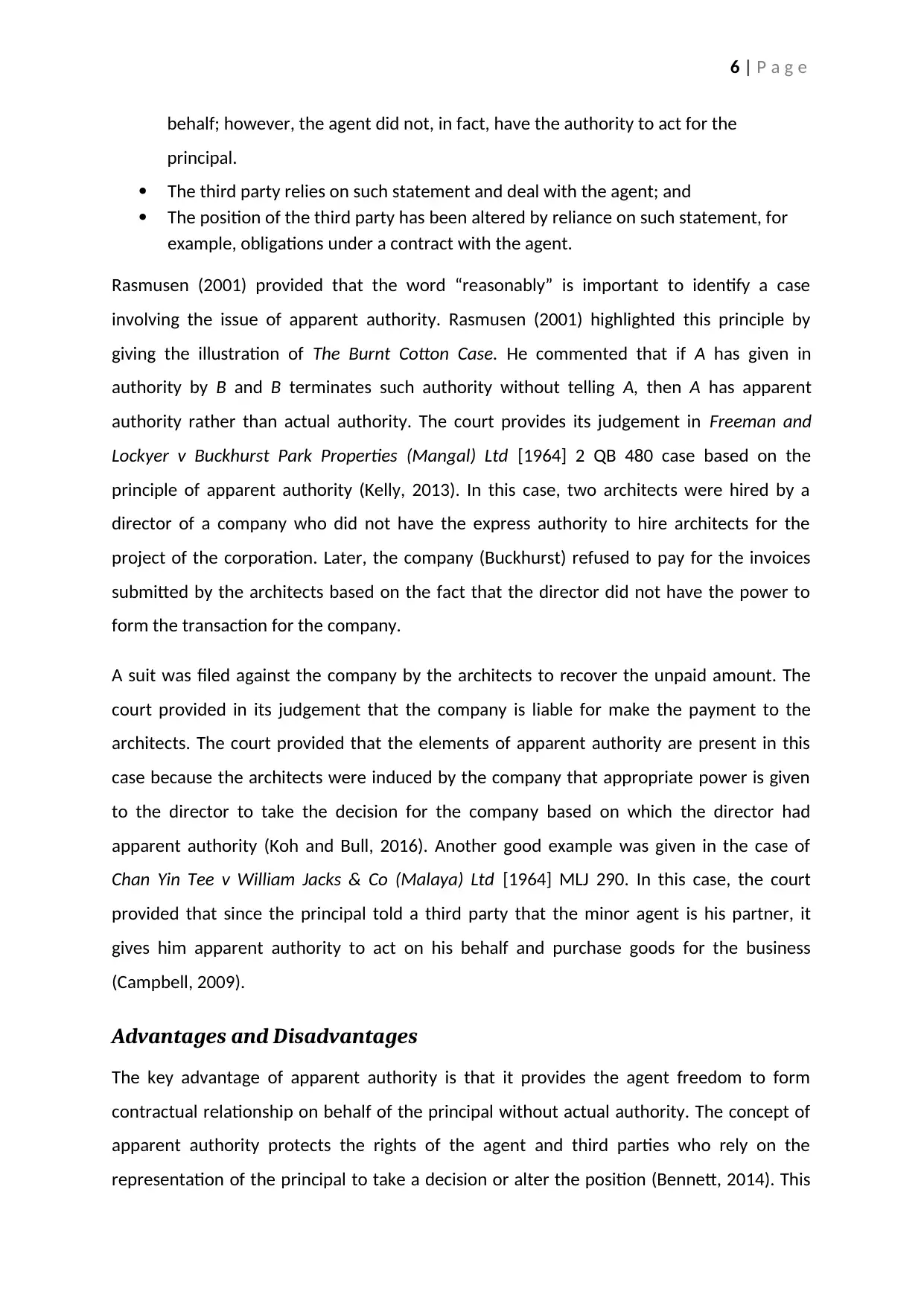
6 | P a g e
behalf; however, the agent did not, in fact, have the authority to act for the
principal.
The third party relies on such statement and deal with the agent; and
The position of the third party has been altered by reliance on such statement, for
example, obligations under a contract with the agent.
Rasmusen (2001) provided that the word “reasonably” is important to identify a case
involving the issue of apparent authority. Rasmusen (2001) highlighted this principle by
giving the illustration of The Burnt Cotton Case. He commented that if A has given in
authority by B and B terminates such authority without telling A, then A has apparent
authority rather than actual authority. The court provides its judgement in Freeman and
Lockyer v Buckhurst Park Properties (Mangal) Ltd [1964] 2 QB 480 case based on the
principle of apparent authority (Kelly, 2013). In this case, two architects were hired by a
director of a company who did not have the express authority to hire architects for the
project of the corporation. Later, the company (Buckhurst) refused to pay for the invoices
submitted by the architects based on the fact that the director did not have the power to
form the transaction for the company.
A suit was filed against the company by the architects to recover the unpaid amount. The
court provided in its judgement that the company is liable for make the payment to the
architects. The court provided that the elements of apparent authority are present in this
case because the architects were induced by the company that appropriate power is given
to the director to take the decision for the company based on which the director had
apparent authority (Koh and Bull, 2016). Another good example was given in the case of
Chan Yin Tee v William Jacks & Co (Malaya) Ltd [1964] MLJ 290. In this case, the court
provided that since the principal told a third party that the minor agent is his partner, it
gives him apparent authority to act on his behalf and purchase goods for the business
(Campbell, 2009).
Advantages and Disadvantages
The key advantage of apparent authority is that it provides the agent freedom to form
contractual relationship on behalf of the principal without actual authority. The concept of
apparent authority protects the rights of the agent and third parties who rely on the
representation of the principal to take a decision or alter the position (Bennett, 2014). This
behalf; however, the agent did not, in fact, have the authority to act for the
principal.
The third party relies on such statement and deal with the agent; and
The position of the third party has been altered by reliance on such statement, for
example, obligations under a contract with the agent.
Rasmusen (2001) provided that the word “reasonably” is important to identify a case
involving the issue of apparent authority. Rasmusen (2001) highlighted this principle by
giving the illustration of The Burnt Cotton Case. He commented that if A has given in
authority by B and B terminates such authority without telling A, then A has apparent
authority rather than actual authority. The court provides its judgement in Freeman and
Lockyer v Buckhurst Park Properties (Mangal) Ltd [1964] 2 QB 480 case based on the
principle of apparent authority (Kelly, 2013). In this case, two architects were hired by a
director of a company who did not have the express authority to hire architects for the
project of the corporation. Later, the company (Buckhurst) refused to pay for the invoices
submitted by the architects based on the fact that the director did not have the power to
form the transaction for the company.
A suit was filed against the company by the architects to recover the unpaid amount. The
court provided in its judgement that the company is liable for make the payment to the
architects. The court provided that the elements of apparent authority are present in this
case because the architects were induced by the company that appropriate power is given
to the director to take the decision for the company based on which the director had
apparent authority (Koh and Bull, 2016). Another good example was given in the case of
Chan Yin Tee v William Jacks & Co (Malaya) Ltd [1964] MLJ 290. In this case, the court
provided that since the principal told a third party that the minor agent is his partner, it
gives him apparent authority to act on his behalf and purchase goods for the business
(Campbell, 2009).
Advantages and Disadvantages
The key advantage of apparent authority is that it provides the agent freedom to form
contractual relationship on behalf of the principal without actual authority. The concept of
apparent authority protects the rights of the agent and third parties who rely on the
representation of the principal to take a decision or alter the position (Bennett, 2014). This
Paraphrase This Document
Need a fresh take? Get an instant paraphrase of this document with our AI Paraphraser
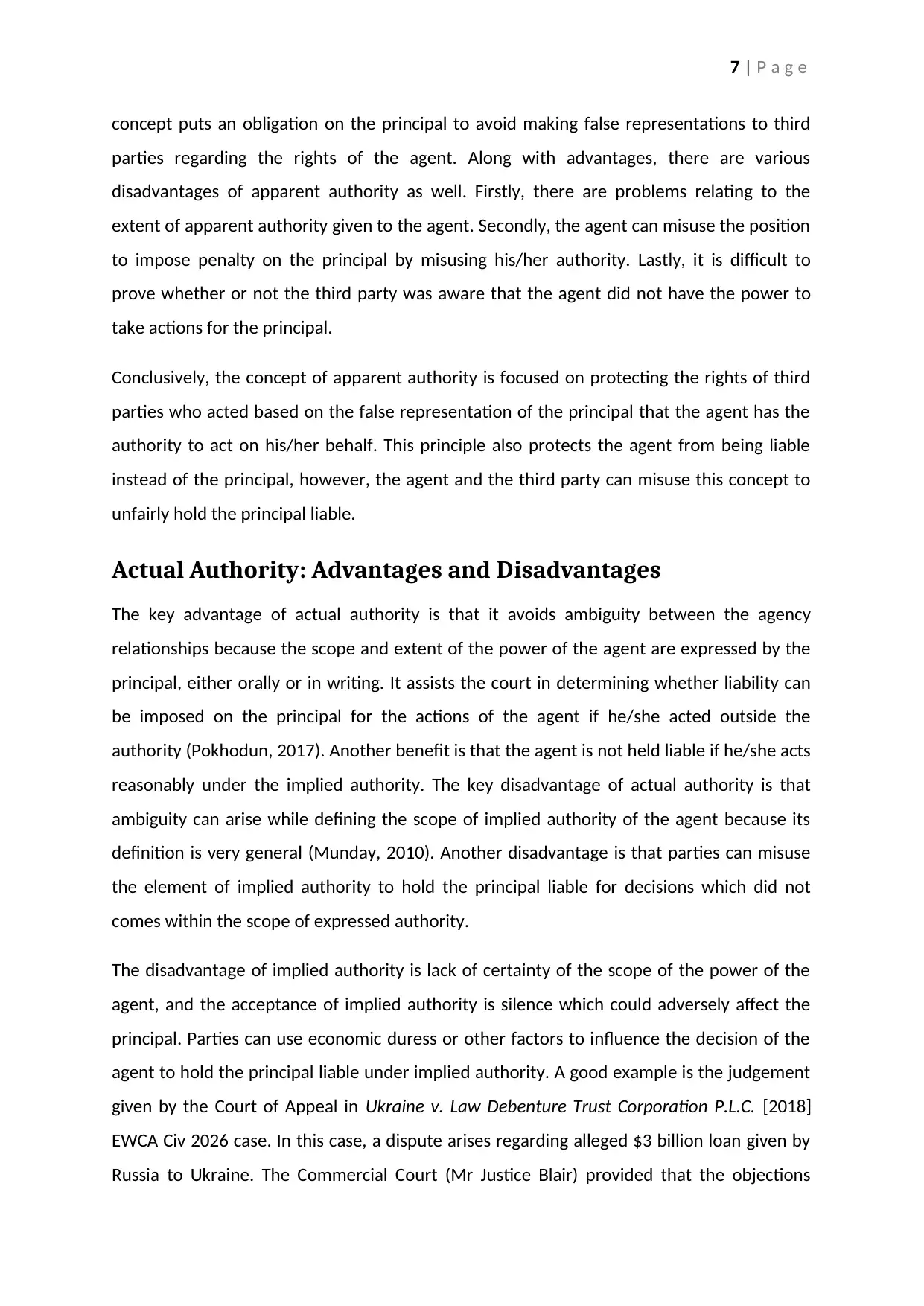
7 | P a g e
concept puts an obligation on the principal to avoid making false representations to third
parties regarding the rights of the agent. Along with advantages, there are various
disadvantages of apparent authority as well. Firstly, there are problems relating to the
extent of apparent authority given to the agent. Secondly, the agent can misuse the position
to impose penalty on the principal by misusing his/her authority. Lastly, it is difficult to
prove whether or not the third party was aware that the agent did not have the power to
take actions for the principal.
Conclusively, the concept of apparent authority is focused on protecting the rights of third
parties who acted based on the false representation of the principal that the agent has the
authority to act on his/her behalf. This principle also protects the agent from being liable
instead of the principal, however, the agent and the third party can misuse this concept to
unfairly hold the principal liable.
Actual Authority: Advantages and Disadvantages
The key advantage of actual authority is that it avoids ambiguity between the agency
relationships because the scope and extent of the power of the agent are expressed by the
principal, either orally or in writing. It assists the court in determining whether liability can
be imposed on the principal for the actions of the agent if he/she acted outside the
authority (Pokhodun, 2017). Another benefit is that the agent is not held liable if he/she acts
reasonably under the implied authority. The key disadvantage of actual authority is that
ambiguity can arise while defining the scope of implied authority of the agent because its
definition is very general (Munday, 2010). Another disadvantage is that parties can misuse
the element of implied authority to hold the principal liable for decisions which did not
comes within the scope of expressed authority.
The disadvantage of implied authority is lack of certainty of the scope of the power of the
agent, and the acceptance of implied authority is silence which could adversely affect the
principal. Parties can use economic duress or other factors to influence the decision of the
agent to hold the principal liable under implied authority. A good example is the judgement
given by the Court of Appeal in Ukraine v. Law Debenture Trust Corporation P.L.C. [2018]
EWCA Civ 2026 case. In this case, a dispute arises regarding alleged $3 billion loan given by
Russia to Ukraine. The Commercial Court (Mr Justice Blair) provided that the objections
concept puts an obligation on the principal to avoid making false representations to third
parties regarding the rights of the agent. Along with advantages, there are various
disadvantages of apparent authority as well. Firstly, there are problems relating to the
extent of apparent authority given to the agent. Secondly, the agent can misuse the position
to impose penalty on the principal by misusing his/her authority. Lastly, it is difficult to
prove whether or not the third party was aware that the agent did not have the power to
take actions for the principal.
Conclusively, the concept of apparent authority is focused on protecting the rights of third
parties who acted based on the false representation of the principal that the agent has the
authority to act on his/her behalf. This principle also protects the agent from being liable
instead of the principal, however, the agent and the third party can misuse this concept to
unfairly hold the principal liable.
Actual Authority: Advantages and Disadvantages
The key advantage of actual authority is that it avoids ambiguity between the agency
relationships because the scope and extent of the power of the agent are expressed by the
principal, either orally or in writing. It assists the court in determining whether liability can
be imposed on the principal for the actions of the agent if he/she acted outside the
authority (Pokhodun, 2017). Another benefit is that the agent is not held liable if he/she acts
reasonably under the implied authority. The key disadvantage of actual authority is that
ambiguity can arise while defining the scope of implied authority of the agent because its
definition is very general (Munday, 2010). Another disadvantage is that parties can misuse
the element of implied authority to hold the principal liable for decisions which did not
comes within the scope of expressed authority.
The disadvantage of implied authority is lack of certainty of the scope of the power of the
agent, and the acceptance of implied authority is silence which could adversely affect the
principal. Parties can use economic duress or other factors to influence the decision of the
agent to hold the principal liable under implied authority. A good example is the judgement
given by the Court of Appeal in Ukraine v. Law Debenture Trust Corporation P.L.C. [2018]
EWCA Civ 2026 case. In this case, a dispute arises regarding alleged $3 billion loan given by
Russia to Ukraine. The Commercial Court (Mr Justice Blair) provided that the objections
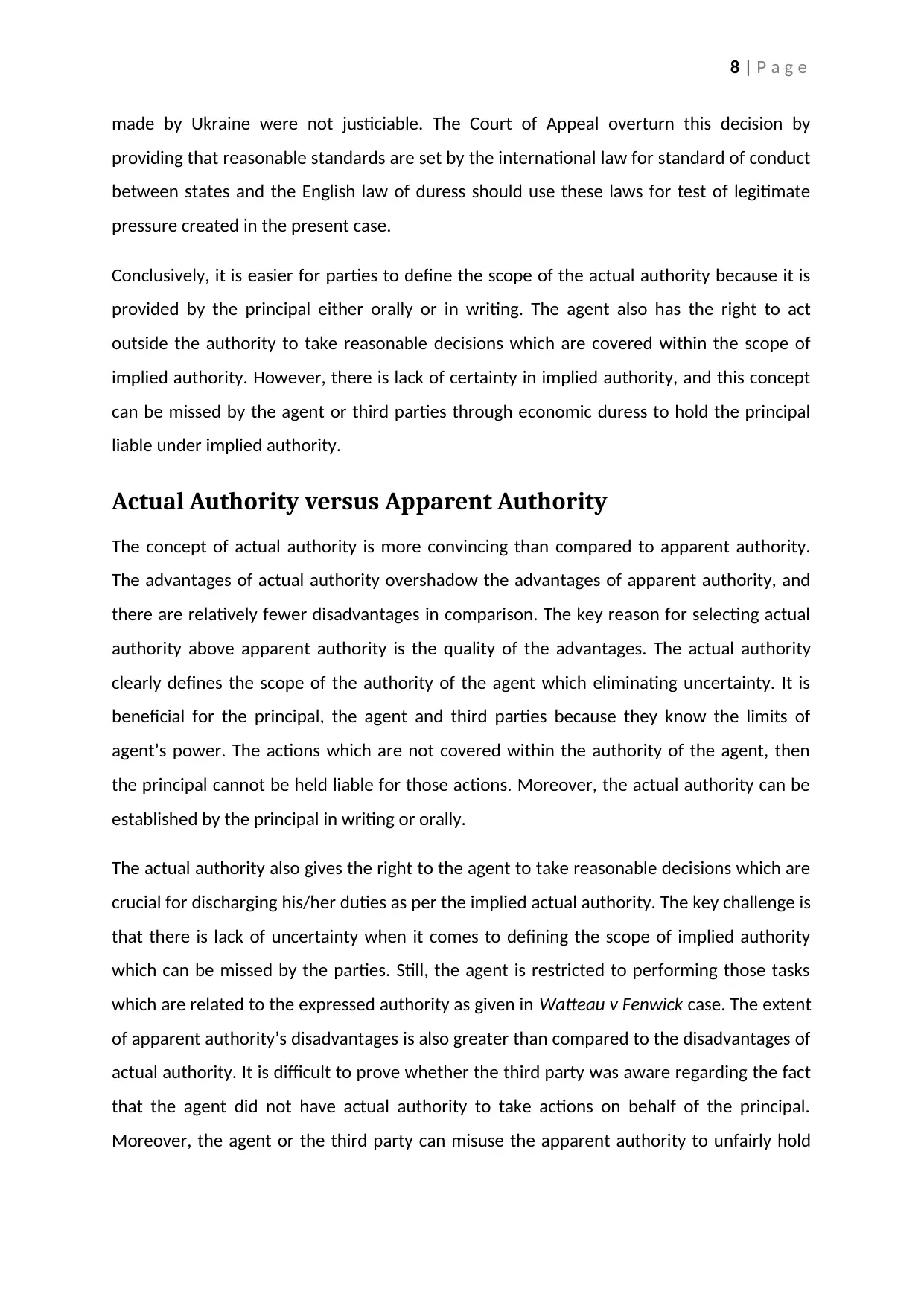
8 | P a g e
made by Ukraine were not justiciable. The Court of Appeal overturn this decision by
providing that reasonable standards are set by the international law for standard of conduct
between states and the English law of duress should use these laws for test of legitimate
pressure created in the present case.
Conclusively, it is easier for parties to define the scope of the actual authority because it is
provided by the principal either orally or in writing. The agent also has the right to act
outside the authority to take reasonable decisions which are covered within the scope of
implied authority. However, there is lack of certainty in implied authority, and this concept
can be missed by the agent or third parties through economic duress to hold the principal
liable under implied authority.
Actual Authority versus Apparent Authority
The concept of actual authority is more convincing than compared to apparent authority.
The advantages of actual authority overshadow the advantages of apparent authority, and
there are relatively fewer disadvantages in comparison. The key reason for selecting actual
authority above apparent authority is the quality of the advantages. The actual authority
clearly defines the scope of the authority of the agent which eliminating uncertainty. It is
beneficial for the principal, the agent and third parties because they know the limits of
agent’s power. The actions which are not covered within the authority of the agent, then
the principal cannot be held liable for those actions. Moreover, the actual authority can be
established by the principal in writing or orally.
The actual authority also gives the right to the agent to take reasonable decisions which are
crucial for discharging his/her duties as per the implied actual authority. The key challenge is
that there is lack of uncertainty when it comes to defining the scope of implied authority
which can be missed by the parties. Still, the agent is restricted to performing those tasks
which are related to the expressed authority as given in Watteau v Fenwick case. The extent
of apparent authority’s disadvantages is also greater than compared to the disadvantages of
actual authority. It is difficult to prove whether the third party was aware regarding the fact
that the agent did not have actual authority to take actions on behalf of the principal.
Moreover, the agent or the third party can misuse the apparent authority to unfairly hold
made by Ukraine were not justiciable. The Court of Appeal overturn this decision by
providing that reasonable standards are set by the international law for standard of conduct
between states and the English law of duress should use these laws for test of legitimate
pressure created in the present case.
Conclusively, it is easier for parties to define the scope of the actual authority because it is
provided by the principal either orally or in writing. The agent also has the right to act
outside the authority to take reasonable decisions which are covered within the scope of
implied authority. However, there is lack of certainty in implied authority, and this concept
can be missed by the agent or third parties through economic duress to hold the principal
liable under implied authority.
Actual Authority versus Apparent Authority
The concept of actual authority is more convincing than compared to apparent authority.
The advantages of actual authority overshadow the advantages of apparent authority, and
there are relatively fewer disadvantages in comparison. The key reason for selecting actual
authority above apparent authority is the quality of the advantages. The actual authority
clearly defines the scope of the authority of the agent which eliminating uncertainty. It is
beneficial for the principal, the agent and third parties because they know the limits of
agent’s power. The actions which are not covered within the authority of the agent, then
the principal cannot be held liable for those actions. Moreover, the actual authority can be
established by the principal in writing or orally.
The actual authority also gives the right to the agent to take reasonable decisions which are
crucial for discharging his/her duties as per the implied actual authority. The key challenge is
that there is lack of uncertainty when it comes to defining the scope of implied authority
which can be missed by the parties. Still, the agent is restricted to performing those tasks
which are related to the expressed authority as given in Watteau v Fenwick case. The extent
of apparent authority’s disadvantages is also greater than compared to the disadvantages of
actual authority. It is difficult to prove whether the third party was aware regarding the fact
that the agent did not have actual authority to take actions on behalf of the principal.
Moreover, the agent or the third party can misuse the apparent authority to unfairly hold
⊘ This is a preview!⊘
Do you want full access?
Subscribe today to unlock all pages.

Trusted by 1+ million students worldwide

9 | P a g e
the principal liable for their actions. Therefore, actual authority is more convincing than
compared to apparent authority.
the principal liable for their actions. Therefore, actual authority is more convincing than
compared to apparent authority.
Paraphrase This Document
Need a fresh take? Get an instant paraphrase of this document with our AI Paraphraser
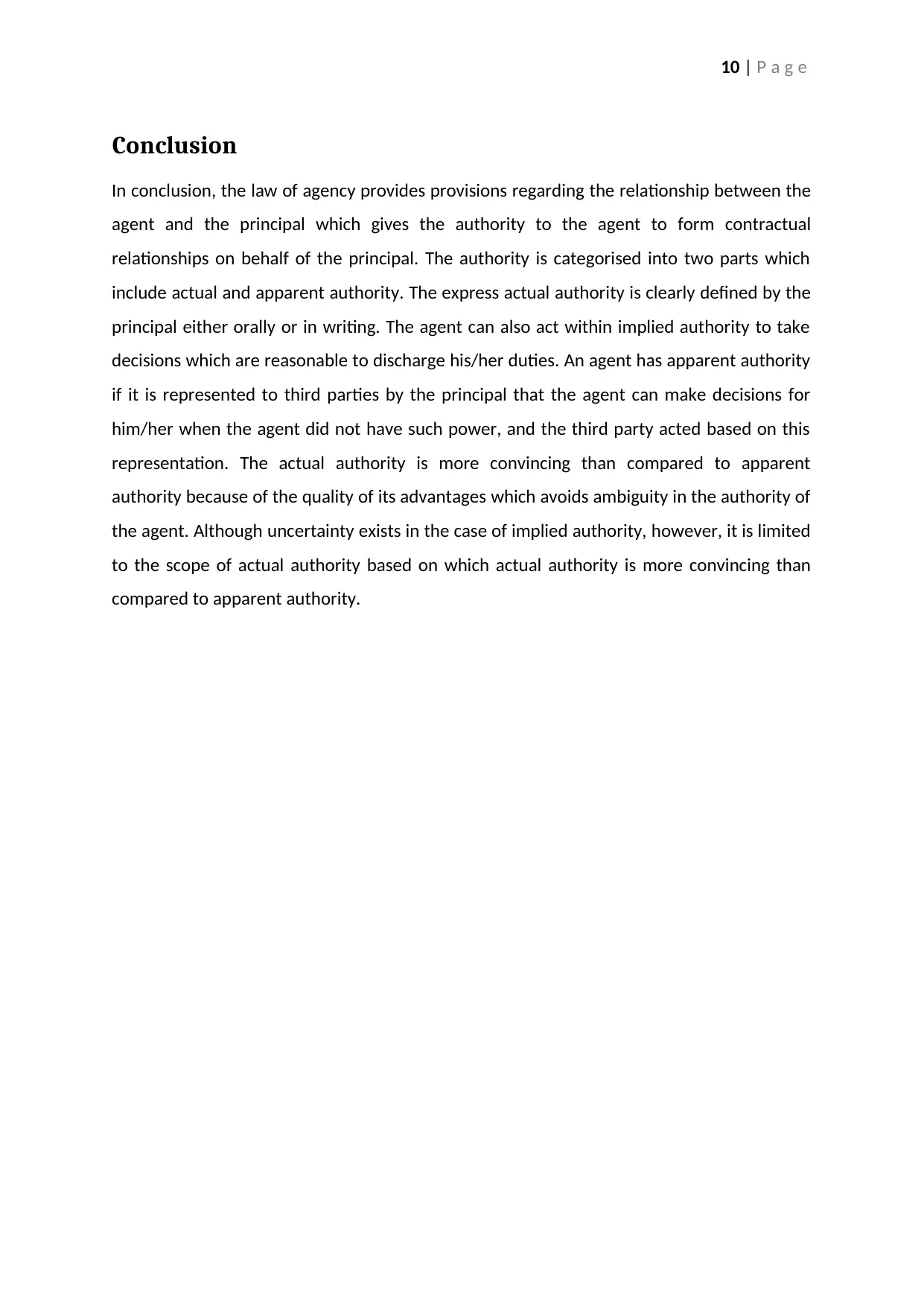
10 | P a g e
Conclusion
In conclusion, the law of agency provides provisions regarding the relationship between the
agent and the principal which gives the authority to the agent to form contractual
relationships on behalf of the principal. The authority is categorised into two parts which
include actual and apparent authority. The express actual authority is clearly defined by the
principal either orally or in writing. The agent can also act within implied authority to take
decisions which are reasonable to discharge his/her duties. An agent has apparent authority
if it is represented to third parties by the principal that the agent can make decisions for
him/her when the agent did not have such power, and the third party acted based on this
representation. The actual authority is more convincing than compared to apparent
authority because of the quality of its advantages which avoids ambiguity in the authority of
the agent. Although uncertainty exists in the case of implied authority, however, it is limited
to the scope of actual authority based on which actual authority is more convincing than
compared to apparent authority.
Conclusion
In conclusion, the law of agency provides provisions regarding the relationship between the
agent and the principal which gives the authority to the agent to form contractual
relationships on behalf of the principal. The authority is categorised into two parts which
include actual and apparent authority. The express actual authority is clearly defined by the
principal either orally or in writing. The agent can also act within implied authority to take
decisions which are reasonable to discharge his/her duties. An agent has apparent authority
if it is represented to third parties by the principal that the agent can make decisions for
him/her when the agent did not have such power, and the third party acted based on this
representation. The actual authority is more convincing than compared to apparent
authority because of the quality of its advantages which avoids ambiguity in the authority of
the agent. Although uncertainty exists in the case of implied authority, however, it is limited
to the scope of actual authority based on which actual authority is more convincing than
compared to apparent authority.
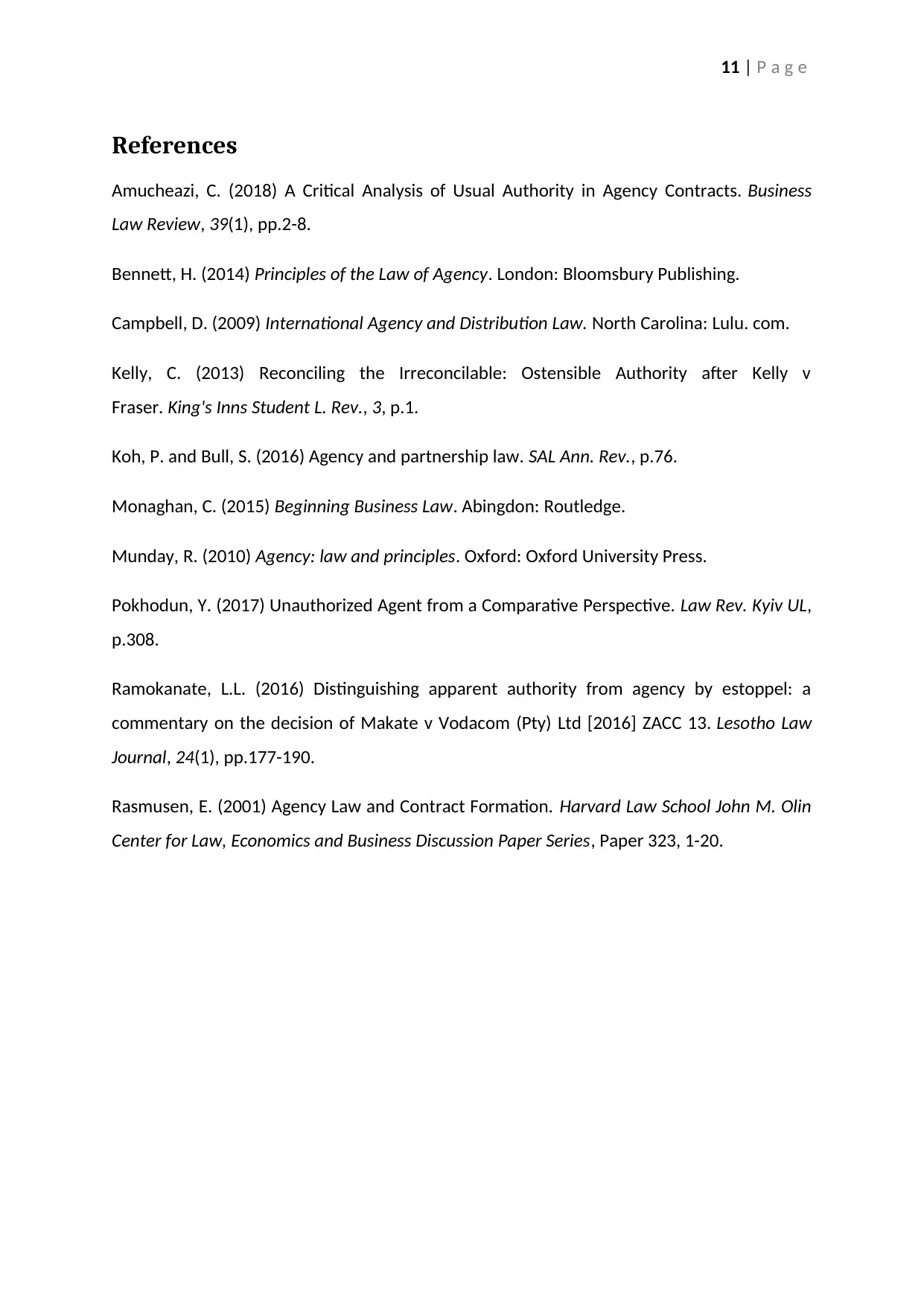
11 | P a g e
References
Amucheazi, C. (2018) A Critical Analysis of Usual Authority in Agency Contracts. Business
Law Review, 39(1), pp.2-8.
Bennett, H. (2014) Principles of the Law of Agency. London: Bloomsbury Publishing.
Campbell, D. (2009) International Agency and Distribution Law. North Carolina: Lulu. com.
Kelly, C. (2013) Reconciling the Irreconcilable: Ostensible Authority after Kelly v
Fraser. King's Inns Student L. Rev., 3, p.1.
Koh, P. and Bull, S. (2016) Agency and partnership law. SAL Ann. Rev., p.76.
Monaghan, C. (2015) Beginning Business Law. Abingdon: Routledge.
Munday, R. (2010) Agency: law and principles. Oxford: Oxford University Press.
Pokhodun, Y. (2017) Unauthorized Agent from a Comparative Perspective. Law Rev. Kyiv UL,
p.308.
Ramokanate, L.L. (2016) Distinguishing apparent authority from agency by estoppel: a
commentary on the decision of Makate v Vodacom (Pty) Ltd [2016] ZACC 13. Lesotho Law
Journal, 24(1), pp.177-190.
Rasmusen, E. (2001) Agency Law and Contract Formation. Harvard Law School John M. Olin
Center for Law, Economics and Business Discussion Paper Series, Paper 323, 1-20.
References
Amucheazi, C. (2018) A Critical Analysis of Usual Authority in Agency Contracts. Business
Law Review, 39(1), pp.2-8.
Bennett, H. (2014) Principles of the Law of Agency. London: Bloomsbury Publishing.
Campbell, D. (2009) International Agency and Distribution Law. North Carolina: Lulu. com.
Kelly, C. (2013) Reconciling the Irreconcilable: Ostensible Authority after Kelly v
Fraser. King's Inns Student L. Rev., 3, p.1.
Koh, P. and Bull, S. (2016) Agency and partnership law. SAL Ann. Rev., p.76.
Monaghan, C. (2015) Beginning Business Law. Abingdon: Routledge.
Munday, R. (2010) Agency: law and principles. Oxford: Oxford University Press.
Pokhodun, Y. (2017) Unauthorized Agent from a Comparative Perspective. Law Rev. Kyiv UL,
p.308.
Ramokanate, L.L. (2016) Distinguishing apparent authority from agency by estoppel: a
commentary on the decision of Makate v Vodacom (Pty) Ltd [2016] ZACC 13. Lesotho Law
Journal, 24(1), pp.177-190.
Rasmusen, E. (2001) Agency Law and Contract Formation. Harvard Law School John M. Olin
Center for Law, Economics and Business Discussion Paper Series, Paper 323, 1-20.
⊘ This is a preview!⊘
Do you want full access?
Subscribe today to unlock all pages.

Trusted by 1+ million students worldwide
1 out of 12
Related Documents
Your All-in-One AI-Powered Toolkit for Academic Success.
+13062052269
info@desklib.com
Available 24*7 on WhatsApp / Email
![[object Object]](/_next/static/media/star-bottom.7253800d.svg)
Unlock your academic potential
Copyright © 2020–2026 A2Z Services. All Rights Reserved. Developed and managed by ZUCOL.




